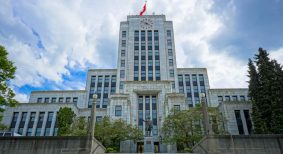Human Resources
Attracting foreign construction workers
With a shortage of skilled labour in Canada, attracting foreign workers continues to be a priority to spur economic growth.
Energy sector workforce evolves and expands
Energy efficiency is projected to create more jobs and assume a larger share of energy sector economic activity in step with a heightened focus on reducing greenhouse gas emissions.
Special assessments foreseen as CPI rises
Coming out of an extended period of low inflation, many condo boards will confront reserve fund shortfalls as the consumer price index now pushes up toward 7 per cent.
LaBranche legacy entrenched in BOMA BC
Wrapping up a 25 year tenure with the Building Owners and Managers Association of British Columbia, soon-to-retire president, Paul LaBranche, characteristically looks through the lens of his organization's strategic plan to assess what he has accomplished.
Construction retirements drive recruitment need
Canada’s construction industry must remain focused on recruitment and retention as more than one quarter of a million workers are expected to retire.
Builders abuzz about cannabis legalization
Ontario’s residential construction industry is anxiously awaiting tools from the province to help it uphold its workplace health and safety obligations when recreational cannabis becomes legal next year.
Mentorship is key to transferring knowledge
The construction industry is forecasted to lose 250,000 skilled tradespeople over the next decade, making mentorship more critical than ever.
Alberta’s Temporary Foreign Worker program
Shortages of skilled workers in Alberta are well-known and well-documented, and this year the federal government overhauled the Temporary Foreign Worker (TFW) Program and created a precarious situation for the future of a successful construction industry in Alberta.
B.C. labour shortage possible during LNG boom
New LNG plants will mean jobs and economic windfall for British Columbia. But the possibility of a B.C. labour shortage could be problematic.
Injury management tips to keep B.C. working
Implementing effective injury management and return to work initiatives can benefit both workers and employers in the construction industry.
Demand for skilled workers high in B.C.
The common chorus is that B.C. is going to need more than 50,000 new skilled workers over the coming decade.
The importance of return to work
Six helpful steps employers can follow when developing an injury management plan.
Taking construction safety to the next level
Six key risk factors that construction site workers should consider and the steps necessary for augmenting the chances of success.
Managing within the law
An employer may mean to provide its employees with fair employment contracts but when disputes arise, parties often disagree on the rights they ...
Change in the workplace is a process not an event
When launching a significant change initiative, one of the biggest mistakes management makes is to view it as an event that happens at a single point in time. Accepting and then embracing change is a process, not an event.
Help wanted
The issue of a pending skilled workers’ shortage is probably the single biggest challenge facing the B.C. construction industry.
Employee engagement that actually engages
participatory and collaborative methods bring people together and involve dynamic, multidirectional communication (leadership to employees, employees to leadership and employee to employee).















